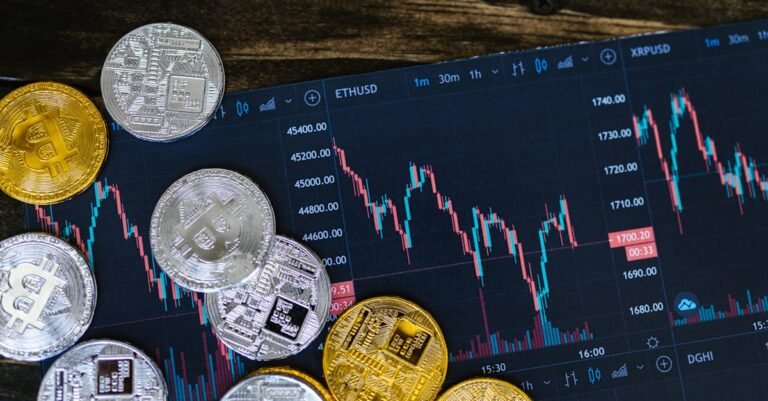Investing in Bricks with Bytes: The Best Altcoins for Tokenized Real Estate
Ever dreamed of owning a piece of prime real estate? Maybe a sleek city apartment, a cozy suburban home, or even a slice of a commercial building? For many of us, that dream feels distant, blocked by hefty down payments, complex paperwork, and the sheer hassle of traditional property investment. It often feels like a club reserved for the already wealthy. But what if I told you technology is smashing down those barriers, making real estate investment accessible to almost anyone with an internet connection? Welcome to the world of tokenized real estate, a revolutionary concept powered by blockchain technology and specific cryptocurrencies known as altcoins.
Imagine owning a tiny fraction of an apartment building in Miami, earning rental income proportional to your share, all managed through a digital token in your crypto wallet. Sounds futuristic, right? Well, it’s happening right now. This isn’t just about buying property with Bitcoin; it’s about fundamentally changing how we own and trade real estate. Altcoins, which are essentially any cryptocurrency other than Bitcoin, are playing a crucial role, providing the specialized platforms and technologies needed to make this digital property revolution a reality. In this article, we’ll explore this exciting space, break down how it works, and dive deep into some of the best altcoins for tokenized real estate that are paving the way for a more open and accessible property market. Get ready to see how digital tokens are turning property ownership from a far off dream into a tangible possibility.
Understanding Tokenized Real Estate and Why Altcoins are Key
Okay, let’s break down this “tokenized real estate” thing first. At its heart, it’s pretty simple. Imagine a physical property – say, an apartment building worth $1 million. Instead of one person needing to cough up the entire million, tokenization allows that property’s ownership to be digitally divided into many smaller pieces, represented by tokens on a blockchain. So, that $1 million building might be split into 100,000 tokens, each worth $10. Suddenly, investing in that building doesn’t require a massive fortune; you could potentially buy just one token for $10, or maybe 100 tokens for $1,000. You become a partial owner, holding a digital representation of your stake.
Think of it like buying shares in a company. When you buy Apple stock, you own a tiny fraction of Apple Inc. With tokenized real estate, you buy a token and own a tiny fraction of a specific property. These tokens live on a blockchain – the same secure and transparent digital ledger technology that powers cryptocurrencies like Bitcoin and Ethereum. This is where blockchain technology truly shines. It provides a trustworthy and unchangeable record of who owns which tokens (and therefore, which part of the property). Transactions are recorded publicly, making the whole process transparent.
So, why is this such a big deal? Let’s look at the benefits:
- Fractional Ownership: This is the game changer. High property prices have locked many people out of the market. Tokenization breaks down properties into affordable chunks, allowing you to invest with much smaller amounts of capital. You can diversify your investments across multiple properties or locations without needing millions.
- Increased Liquidity: Real estate is notoriously illiquid. Selling a property can take months, involving agents, lawyers, and complex negotiations. Tokenized assets, in theory, can be traded much more easily and quickly on secondary markets or specialized platforms, similar to trading stocks or crypto. While this secondary market is still developing, the potential for faster sales is a major draw.
- Greater Accessibility: geografical barriers melt away. You could potentially invest in a property halfway across the world from the comfort of your home, without needing to physically be there or navigate complex foreign ownership laws (though regulations are still evolving and vary significantly).
- Transparency and Security: Blockchain provides a transparent ledger of ownership. Every transaction is recorded and verifiable, reducing the risk of fraud and ownership disputes. Smart contracts, which are self executing contracts with the terms of the agreement directly written into code, can automate processes like rent distribution or dividend payouts, making things more efficient.
- Potential for Diversification: Instead of putting all your money into one property, you can spread smaller amounts across different types of properties (residential, commercial) in various locations, reducing your overall risk.
Now, where do altcoins fit into this picture? While the concept could theoretically run on any blockchain, specific altcoins and their underlying platforms are often designed with features particularly suited for asset tokenization, especially for regulated assets like real estate. Bitcoin, for example, is primarily designed as digital gold or a peer to peer cash system. Its scripting language is limited. Many altcoins, particularly those built on platforms like Ethereum, Solana, Algorand, or specialized chains like Polymesh, offer robust smart contract capabilities. These smart contracts are essential for tokenizing real estate. They automate the rules governing the tokens: how ownership is recorded, how rental income or appreciation dividends are distributed to token holders, voting rights, compliance checks, and potentially even the terms of sale.
Different blockchains offer different advantages. Some prioritize transaction speed and low fees (like Solana or Algorand), which could be crucial for frequent trading or distributions. Others focus heavily on security and compliance features (like Polymesh), which are vital for attracting institutional investors and ensuring regulatory adherence for security tokens (which real estate tokens often are). The platforms built using these altcoins often provide the entire infrastructure: the marketplace for browsing properties, the tools for property owners to tokenize their assets, the wallets for investors to hold their tokens, and the mechanisms for handling legal compliance (like Know Your Customer/Anti Money Laundering checks). The native tokens of these platforms (the altcoins themselves) might be used for paying transaction fees, staking to secure the network, or even for governance, giving token holders a say in the platform’s future development. They are the fuel that powers these specialized real estate tokenization ecosystems.
Think about traditional Real Estate Investment Trusts (REITs). They allow you to invest in a portfolio of properties, but you don’t own a specific piece of a specific building, and you have less control. Tokenization offers potentially more direct ownership and potentially greater transparency about the underlying asset. It aims to combine the benefits of direct property ownership with the liquidity and accessibility of financial markets, all enabled by the specific capabilities of carefully chosen blockchain technology and the altcoins that drive these platforms. The potential market here is enormous – the global real estate market is worth trillions upon trillions of dollars. Even capturing a tiny fraction of that through tokenization represents a massive opportunity, and the altcoins facilitating this transition are positioned right at the forefront.
However, it’s crucial to remember this is still a nascent industry. The technology is new, regulations are still catching up globally, and the promised liquidity isn’t always there yet. Secondary markets for trading these tokens are often thin, meaning you might not be able to sell your tokens as quickly or easily as you’d like. Understanding the specific altcoin, the platform built on it, the team behind it, the legal structure of the tokenized asset, and the underlying property itself is absolutely critical before considering any investment. We’re talking about blending the complexities of real estate with the volatility and technical nuances of crypto – it requires careful navigation. But the fundamental shift towards more accessible, transparent, and potentially liquid real estate investment is undeniable, and specific altcoins are the engines driving that change.
Top Altcoins Leading the Tokenized Real Estate Charge
Alright, now that we understand the ‘what’ and ‘why’ of tokenized real estate and the role altcoins play, let’s get to the exciting part: which specific projects and their associated altcoins are making waves in this space? It’s important to note that this field is evolving rapidly, and new players emerge while existing ones adapt. Also, sometimes it’s less about the base layer altcoin (like Ethereum or Algorand) itself and more about the specific platform built on that blockchain. However, the capabilities and features of the underlying blockchain are crucial for the platform’s success. Here are a few key names you should know about, representing different approaches to cracking the crypto real estate puzzle.
Propy (PRO)
Propy is often mentioned as one of the pioneers in the blockchain real estate space. They aren’t just focused on fractional ownership; their ambitious goal is to automate the entire real estate transaction process using blockchain and smart contracts. Think about all the steps involved in buying a house: offers, agreements, title deeds, payments – Propy aims to streamline these, making transactions faster, cheaper, and more secure. They famously facilitated the first US real estate NFT (Non Fungible Token) sale, where ownership of a physical property was transferred via an NFT transaction on the blockchain. This demonstrated a powerful proof of concept for how blockchain could handle unique asset transfers like property titles.
The platform uses smart contracts to manage the purchase process, holding funds in escrow and releasing them automatically when conditions are met. They have developed tools for agents, buyers, and sellers, integrating blockchain into the existing real estate workflow. The PRO token, an ERC 20 token originally on Ethereum, plays a role within their ecosystem. It’s used to unlock features on the platform, pay for certain services like title and escrow fees related to the NFT transactions, and potentially for staking or governance in the future. Propy’s focus is broad, aiming to revolutionize how traditional real estate deals are done globally, using blockchain for title registry and transaction settlement. Their approach highlights how blockchain can integrate with and improve existing legal frameworks for property ownership rather than completely replacing them overnight. They’ve facilitated sales in various locations, showcasing the potential for international property transactions simplified through blockchain. The challenge remains widespread adoption by traditional real estate professionals and navigating the complex web of local property laws globally. However, their early moves and focus on the full transaction lifecycle make Propy a significant player to watch.
RealT
RealT takes a very direct approach to fractional ownership real estate, focusing specifically on offering tokens representing shares in US rental properties. If you want tangible exposure to the US housing market and receive rental income, RealT is a platform designed precisely for that. They typically identify single family homes or small multi family units, place each property into a distinct legal entity (like an LLC), and then issue tokens on a blockchain that represent ownership shares in that specific entity. Investors buy these tokens and become partial owners of the property.
What’s particularly interesting about RealT is their implementation. They initially launched on Ethereum but have largely migrated to the Gnosis Chain (formerly xDai Chain), a Layer 2 scaling solution, to dramatically reduce transaction fees and increase speed. This is crucial for their model because they pay out rental income to token holders daily or weekly via stablecoins (like USDC) directly to their wallets. High Ethereum gas fees would make such frequent, small payouts impractical. Using Gnosis Chain makes this efficient and cost effective. Each property has its own unique token (e.g., a token for 123 Main Street, another for 456 Oak Avenue), providing very specific asset exposure. Investors can browse properties on the RealT marketplace, view details like expected rental yield, property condition reports, and purchase tokens directly. They adhere strictly to regulations, requiring investors to complete KYC/AML procedures, as these tokens are treated as securities. This focus on compliance is vital for legitimacy and long term viability. RealT provides a clear example of how tokenized real estate can generate passive income similar to traditional rental properties but with a much lower barrier to entry and potentially easier management (as RealT handles property management). The key considerations are the reliance on the RealT platform itself, the specific risks associated with the US rental market, and the regulatory framework governing these security tokens.
Lofty AI
Lofty AI offers another compelling take on fractional real estate investment, utilizing the Algorand blockchain. Their unique selling proposition includes using Artificial Intelligence (AI) to identify properties with high potential for appreciation and rental income. This data driven approach aims to take some of the guesswork out of property selection for investors. Like RealT, Lofty focuses on making investment incredibly accessible, with minimum investments often starting as low as $50. This truly democratizes access to property investment.
Properties listed on Lofty are also placed into LLCs, and tokens representing ownership are issued on Algorand. The choice of Algorand is strategic. Algorand is known for its high transaction speeds, low fees (fractions of a cent), and strong security features, making it well suited for handling potentially large numbers of small transactions and frequent distributions. Lofty token holders receive their share of the rental income paid out daily directly into their connected wallets. They also benefit from potential property appreciation when the property value increases. A key feature is the potential for liquidity; Lofty aims to facilitate peer to peer trading of property tokens on their platform, although like many tokenized assets, actual liquidity can vary depending on market demand. They emphasize transparency, providing detailed information and documents for each listed property. The combination of AI driven selection, a very low entry point, daily rental payouts, and the efficiency of the Algorand blockchain makes Lofty an innovative platform pushing the boundaries of accessible real estate investment. Investors need to consider the accuracy of the AI predictions, the specific risks of the chosen properties, and the development of the secondary market liquidity on the Lofty platform.
Polymesh (POLYX)
Polymesh is different from the platforms mentioned above. It’s not a platform for browsing and buying specific property tokens directly. Instead, Polymesh is a purpose built, public, permissioned blockchain specifically designed for regulated assets, also known as security tokens. Real estate tokens, especially those representing ownership or promising returns like rental income, often fall under securities regulations in many jurisdictions. Creating and managing these compliant tokens requires specific technical features that standard blockchains might lack.
Polymesh tackles this head on. Its architecture includes built in features for identity verification (participants need to be verified), compliance rules (enforcing jurisdictional regulations or specific offering rules at the blockchain level), asset lifecycle management, and confidential transactions. This focus on regulation and institutional needs makes Polymesh a potentially attractive foundation for large scale, compliant real estate tokenization projects, perhaps involving major developers, funds, or REITs looking to leverage blockchain. The native token of the Polymesh blockchain is POLYX. POLYX is used for paying transaction fees, staking to secure the network through its Nominated Proof of Stake consensus mechanism, and participating in on chain governance. While you might not buy a fraction of a house directly using POLYX today, platforms and issuers looking to tokenize real estate in a highly regulated and secure manner might choose to build on top of Polymesh. Its success hinges on attracting these issuers and projects that require its specialized features for security tokens. It represents the infrastructure layer aiming to bring compliance and institutional trust to the world of asset tokenization platforms, including real estate.
These are just a few examples, and the landscape includes other blockchains like Solana or Avalanche being explored for their speed and scalability, and platforms focused on specific niches like commercial real estate or land. The key takeaway is that different altcoins and platforms offer unique strengths, whether it’s streamlining transactions (Propy), providing direct rental income (RealT, Lofty), or building compliant infrastructure (Polymesh). Choosing the “best” depends on your specific investment goals, risk tolerance, and desired level of involvement. Researching each project’s technology, team, legal structure, and traction is absolutely essential before diving into this exciting frontier of investing in real estate with crypto.
Getting Started and Navigating the Risks in Tokenized Real Estate
Okay, the idea of owning property through digital tokens sounds fantastic, potentially offering lower entry points and passive income. But before you jump in headfirst, it’s crucial to understand how to get started and, perhaps more importantly, the risks involved. This isn’t a get rich quick scheme; it’s a novel form of investment blending two complex worlds: real estate and cryptocurrency. Proceeding with caution and doing thorough research is paramount.
So, how does one actually begin exploring tokenized real estate investment?
- Education First: Before anything else, deepen your understanding. Learn the basics of blockchain technology, smart contracts, and the specific platforms you’re interested in (like the ones we discussed – RealT, Lofty, Propy, etc.). Understand what “tokenization” actually means in the context of the specific platform. Does the token represent direct equity ownership, participation in debt, or something else? Read their whitepapers, FAQs, and any available legal documentation.
- Platform Research and Selection: Not all platforms are created equal. Investigate the team behind the platform, their experience in both real estate and blockchain, and their track record. Look for transparency regarding property selection, fees (platform fees, transaction fees, property management fees), and the legal structure of the investments. Check reviews or community feedback, but always verify information independently.
- Property Due Diligence: Just like traditional real estate, don’t invest blindly. Examine the details of the underlying property being tokenized. Where is it located? What’s its condition? What are the projected rental yields and vacancy rates? What are the local market conditions? Good platforms should provide ample documentation like appraisals, inspection reports, and financial projections. Treat it like buying actual real estate, because, in a way, you are.
- Understand the Legal Structure: This is critical. How is the ownership legally represented? Is each property held in a separate LLC? What are your rights as a token holder? Are these tokens considered securities in your jurisdiction, and if so, what does that imply? Ensure the platform complies with relevant regulations, including KYC (Know Your Customer) and AML (Anti Money Laundering) checks, which are standard for legitimate financial services.
- Wallet Setup and Security: You’ll need a compatible cryptocurrency wallet to hold your tokens and receive income distributions. Platforms usually specify which wallets work (e.g., MetaMask for Ethereum/Gnosis Chain, specific wallets for Algorand). Prioritize security: use strong passwords, enable two factor authentication, and understand seed phrase management. Your wallet security is your responsibility.
- Start Small: Given the novelty and risks, consider starting with a small investment amount you can afford to lose. This allows you to learn the process, understand the platform dynamics, and experience the income distribution (if applicable) without taking excessive risk.
Now, let’s talk honestly about the risks. While the potential is exciting, ignoring the downsides would be irresponsible. Crypto investment risks are amplified when combined with real estate complexities.
- Market Volatility: You face volatility from two directions. The underlying real estate market can fluctuate, impacting property values and rental income. Additionally, the value of the platform’s native token (if relevant) or even the broader crypto market sentiment can indirectly affect liquidity or platform stability. While property tokens aim to be tied to the asset’s value, the overall crypto market can influence investor confidence.
- Platform Risk: You are relying on the tokenization platform to operate effectively, securely, and honestly. What happens if the platform goes bankrupt, gets hacked, or mismanages the properties? Ensure you understand the platform’s business model, security measures, and what legal recourse you might have. Centralized platforms represent a single point of failure.
- Liquidity Risk: While tokenization aims to improve liquidity, the secondary market for trading real estate tokens is still very underdeveloped. Unlike major cryptocurrencies or stocks, you might not be able to sell your tokens quickly or at your desired price. Finding a buyer might take time, or you might have to sell at a discount. Don’t assume easy liquidity.
- Regulatory Uncertainty: The legal landscape for digital property assets and security tokens is still evolving worldwide. Regulations could change, potentially impacting the legality, taxation, or operational requirements of tokenized real estate platforms and investments. This adds a layer of uncertainty that traditional real estate doesn’t face in the same way.
- Smart Contract Risk: While smart contracts automate processes, they are code written by humans and can contain bugs or vulnerabilities. An exploit in a smart contract could potentially lead to loss of funds or ownership record issues. Audits help mitigate this, but the risk isn’t zero.
- Complexity: Combining real estate nuances (property management, maintenance, local laws) with blockchain technicalities (wallet management, transaction fees, blockchain specifics) creates a steep learning curve. It requires more diligence than simply buying stocks or an ETF.
Comparing this to traditional real estate investing, you trade off some direct control and the tangible nature of physical ownership for increased accessibility, lower entry points, and potential automation. Traditional methods have established legal frameworks and processes, albeit often slow and expensive. Tokenization offers efficiency and access but comes with technology risks and regulatory newness. It’s not necessarily better or worse, just different, with its own set of pros and cons.
Ultimately, navigating this space requires a blend of optimism about the technology’s potential and a healthy dose of skepticism. Do Your Own Research (DYOR) isn’t just a crypto catchphrase; it’s fundamental advice here. Read everything you can, understand the specific altcoin/blockchain being used and why, scrutinize the platform, evaluate the underlying real estate asset, be aware of the fees, and never invest more than you can afford to lose. The future of DeFi real estate looks promising, but early adventurers need to tread carefully.
The Future is Fractional: Wrapping Up Your Real Estate Journey
We’ve journeyed through the exciting, evolving landscape of tokenized real estate. We’ve seen how blockchain technology and innovative altcoins are working together to dismantle traditional barriers, making property investment more accessible than ever before. Concepts like fractional ownership, improved liquidity (even if still developing), and enhanced transparency are not just buzzwords; they represent a fundamental shift towards democratizing one of the world’s largest asset classes.
Platforms leveraging specific altcoins – whether it’s Propy streamlining entire transactions, RealT and Lofty delivering rental income via tokens on efficient chains like Gnosis and Algorand, or Polymesh building the compliant infrastructure for regulated security tokens – are pioneering this change. They offer tantalizing glimpses into a future where owning a piece of global real estate might be as simple as a few clicks in a digital wallet.
However, we also grounded ourselves in reality. This is a new frontier, and with innovation comes risk. Market volatility, platform reliability, regulatory hurdles, and the nascent state of token liquidity are challenges that cannot be ignored. Diligence, education, and a cautious approach are your best allies as you explore crypto real estate opportunities.
The fusion of real estate and blockchain, powered by specialized altcoins, holds immense potential. It promises to unlock wealth creation opportunities for a broader audience and make a traditionally cumbersome asset class more efficient and adaptable for the digital age. While it won’t replace traditional methods overnight, tokenization is carving out a significant niche, offering a compelling alternative for modern investors.
Ready to explore the future of property ownership? The world of tokenized real estate is open for exploration. Start by diving deeper into the platforms and altcoins we’ve discussed. Learn more about how blockchain technology enables this revolution. Remember to conduct thorough research, understand the risks involved, and invest wisely according to your own financial situation and risk tolerance. The journey into digital property starts with knowledge – begin yours today!









